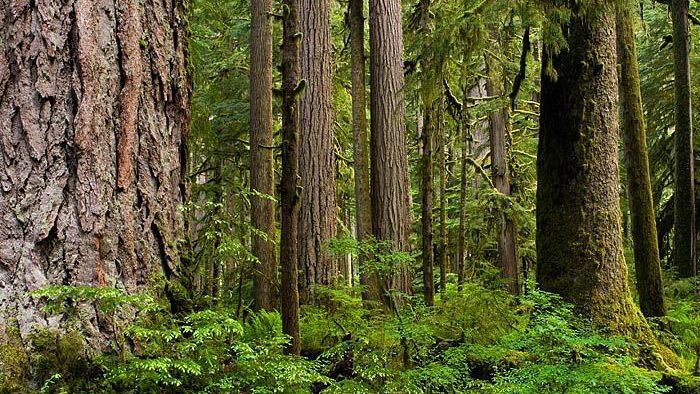Biden Administration Begins Process To Protect And Restore Old Growth Ecosystems Across The US
December 20, 2023
A key ask of the Forest Carbon Coalition becomes a reality

On December 20th, 2023, the Biden Administration announced its intent to amend all 128 national forest management plans to protect and restore old growth ecosystems that have been largely destroyed by logging, grazing, mining, road building, oil and gas infrastructure and other commercial uses of public lands. Old growth forests in the US are hotspots of biological diversity and bulwarks against climate change, capturing and storing more carbon per acre than almost any ecosystem on the planet while keeping nearby communities protected from wildfires, heat waves and water shortages made worse by industrial logging activities and young timber plantations that typically surround federal forests.
The Forest Carbon Coalition – a network of over 100 conservation, scientific, and community organizations across the country was a strong advocate for the plan amendment approach, making it the first ask in its policy blueprint sent to Congress and the Biden Administration in 2021 and updated last August. In particular, the FCC asked for:
- “Nationwide forest plan amendments placing all remaining tracts of unlogged primary and carbon dense natural forests on federal lands into protected area status as refugia for native species, forest carbon reserves, and blueprints for forest recovery. Plan amendments, which could be adopted in less than two years, should also establish forest carbon storage targets for each unit of the federal forest system and propose strategies to achieve those targets.”
For forests lacking in existing old growth, the FCC also asked for establishment of late successional reserves on each unit of the federal forest system as areas where old growth conditions are allowed to develop over time. It remains to be seen if the Administration will fully implement this approach, but today’s announcement initiates a plan amendment process, an interim policy, and an environmental impact statement that will provide a forum for FCC, its members, and the public to ensure that rigorous science, community-based economics, and indigenous knowledge are applied to ensure the strongest protection possible.
The interim policy is mean to ensure “the careful evaluation of proposed vegetation management activities occurring in areas where old growth forest conditions exist while the national old growth amendment is developed.” There are hundreds of Forest Service projects being readied for the chopping block that will need to be scrutinized, but with its strong nationwide coalition the FCC is hopeful that it can help steer the chainsaws away from lands that are essential for a well-distributed, interconnected system of old growth forests across large landscapes.
Some perspectives from our Steering Committee members:
“As a member of the Patawomek Tribe and a medicinal plant conservation advocate, I applaud the Biden Administration’s intent to incorporate indigenous knowledge into a planning process that will help replenish the land with big old trees and protect eco-cultural practices associated with old-growth forest conditions. After all, indigenous peoples all across this continent relied on old growth forest ecosystems for sustenance, medicines, and spiritual renewal long before the land was colonized, and all the big trees cut down. It’s exciting to think that the tide may be turning.”
- Susan Leopold, Ph.D., Executive Director, United Plant Savers, Linden, VA
(703) 667-0208, susan@unitedplantsavers.org.
“It’s time to put the public back in the concept of public lands, and we commend the Biden Administration for taking a step in the right direction to exclude harmful commercial activities from taking place in forests that are far more valuable for carbon, water, fish, wildlife and plants than they are cut down and turned into wood pellets or two by fours or cleared to make room for more oil and gas infrastructure. But a lot more work needs to be done to ensure that the Administration does not take a one-step-forward-two-steps-back approach by subsidizing logging elsewhere.”
- John Talberth, Ph.D., President and Senior Economist, Center for Sustainable Economy, Port Townsend, WA, (510) 384-5724, jtalberth@sustainable-economy.org.
“These actions by federal forest managers are long overdue. Old-growth forests in the US make huge contributions to the economic well-being of all Americans. Robust evidence has shown for decades that the economic benefits from protecting and expanding old growth forests in the U.S. far exceed the benefits from logging: for workers, local communities, taxpayers, and society as a whole.”
- Ernie Niemi, Natural Resource Economics, Eugene, OR, (541) 505-2704, ernie.niemi@nreconomics.com.


